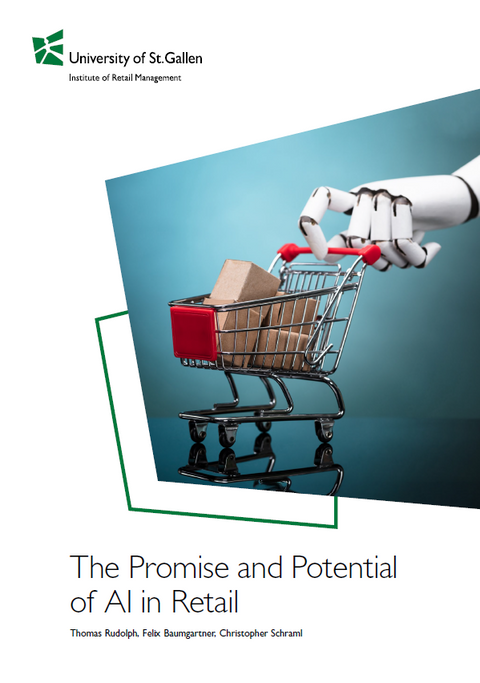
The Promise and Potential of AI in Retail (2025)
Autoren: Thomas Rudolph, Felix Baumgartner, Christopher Schraml (2025)
Sprache: English (available as PDF only)
Artificial Intelligence (AI) could bring about transformative changes in our society. As early as 2029, the world-renowned scientist, inventor, entrepreneur, and author Ray Kurzweil predicts the moment when artificial intelligence will surpass human intelligence. Bill Gates, the founder of Microsoft, has said that no one is better at forecasting the future of AI than Kurzweil. From that point onward, according to Kurzweil’s calculations, it will be possible to link our brains directly to computers — via chips implanted in the neocortex. Human cognitive performance will increase enormously. He assumes that, in the medium term, everyone will replace their smartphone with an AI implant — not only because costs will decline, but also to remain competitive with other people. AI can also enhance the performance of companies. According to Kurzweil, AI could even render large parts of the insurance and banking sectors obsolete. Credit, payment transactions, wealth management — all of these can be automated with AI support. Robo-advisors, AI-based credit assessments and algorithmic trading arealready a reality today. The traditional retail bank could be replaced by intelligent financial platforms.
In this context, the question also arises as to how retail will be affected by the use of AI. Unlike banks or the insurance industry, retail also depends on emotions and social experiences. Seeing, feeling, trying, and experiencing all play an important role. Nevertheless, retail too offers the opportunity to automate many of today’s tasks with the help of AI. Tasks such as inventory management, pricing, shelf management, payment and reordering could be handled by AI with great precision. Will AI also lead to a hyper-personalisation of the shopping experience? The traditional “one size fits all” approach could be replaced by an intelligent alignment with consumers’ individual expectations, thereby professionalising retail marketing.
34 Seiten, ISBN: 978-3-906057-51-4
